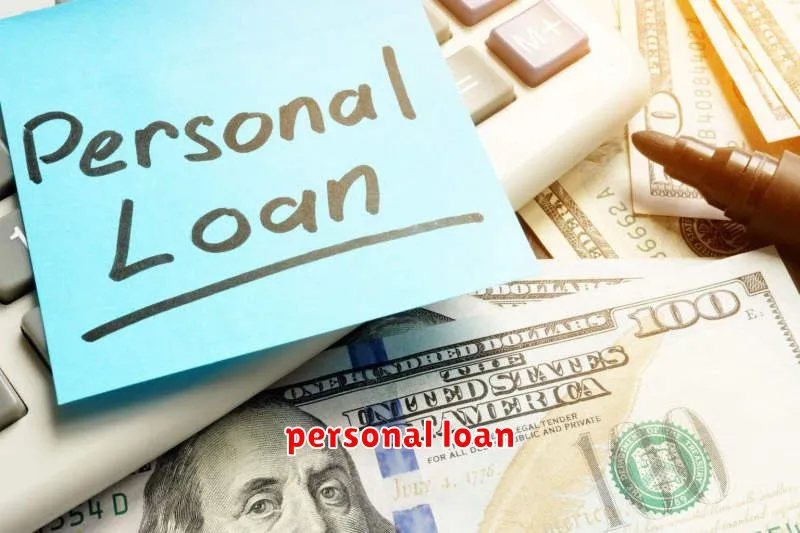Are you considering taking out a personal loan to consolidate debt, finance a home renovation, or fund a dream vacation? Personal loans can be a valuable tool for achieving financial goals, but they also come with risks. It’s crucial to understand how to use personal loans wisely to avoid the potential pitfalls of borrowing money. This article will delve into practical strategies for managing personal loans effectively, ensuring you get the most out of your loan while minimizing financial strain.
Before you dive into the world of personal loans, it’s essential to assess your financial situation and determine if a loan is truly necessary. Consider your budget, income, and existing debt obligations. Carefully evaluate the interest rates, repayment terms, and potential fees associated with different loan options. By taking a proactive approach to understanding your financial landscape, you can make informed decisions about borrowing money and pave the way for a positive loan experience.
Understanding Personal Loans
A personal loan is a type of unsecured loan that you can use for a variety of purposes, such as debt consolidation, home improvement, medical expenses, or even a vacation. Unlike secured loans, such as mortgages or auto loans, personal loans are not backed by collateral, meaning the lender has no right to seize any of your assets if you default on the loan.
Personal loans typically come with a fixed interest rate and a set repayment term, which can range from a few months to several years. The interest rate you qualify for will depend on your credit score, income, and debt-to-income ratio.
There are two main types of personal loans: unsecured personal loans and secured personal loans. Unsecured personal loans are the most common type and do not require any collateral. Secured personal loans, on the other hand, require you to pledge an asset, such as a car or savings account, as collateral. This can help you qualify for a lower interest rate, but you risk losing your asset if you default on the loan.
It’s important to understand the terms and conditions of any personal loan before you take it out. This includes the interest rate, repayment term, fees, and any other charges. You should also carefully consider your budget and ability to repay the loan before you borrow.
RECITATION
How to Choose the Right Personal Loan for Your Needs
Before you apply for a personal loan, it’s crucial to understand the different types of loans available and choose one that aligns with your specific needs and financial situation. Here are some key factors to consider:
Loan Purpose: Personal loans are versatile and can be used for various purposes, such as debt consolidation, home improvements, medical expenses, or even travel. Specify your reason for borrowing to narrow down your options. For example, a loan for home improvement might offer a lower interest rate than one for debt consolidation.
Loan Amount: Determine the exact amount of money you need to borrow. Avoid taking out a larger loan than necessary, as this will increase your interest payments over time.
Interest Rate: Interest rates vary significantly between lenders, so shop around and compare offers carefully. Look for the lowest interest rate possible to minimize your overall borrowing cost.
Loan Term: The loan term is the length of time you have to repay the loan. A shorter term generally results in higher monthly payments but lower overall interest. A longer term can lower your monthly payments but lead to higher interest charges.
Fees: Some lenders may charge origination fees, prepayment penalties, or other fees associated with the loan. Ensure you understand all fees involved before signing any loan agreement.
Credit Score: Your credit score plays a major role in determining the interest rate and loan terms you qualify for. A higher credit score can lead to more favorable loan offers.
By carefully considering these factors, you can choose a personal loan that fits your needs and helps you achieve your financial goals. Remember, responsible borrowing involves understanding the loan terms and ensuring that you can comfortably manage the monthly payments.
Tips for Managing Personal Loan Repayments
Taking out a personal loan can be a helpful way to finance a major purchase or cover unexpected expenses. However, it’s crucial to manage your repayments responsibly to avoid falling into debt. Here are some tips for effectively handling your personal loan payments:
Budget and Prioritize: Create a detailed budget to track your income and expenses. Allocate funds specifically for your loan repayment and prioritize it alongside essential bills. This ensures that you don’t fall behind on your obligations.
Automate Payments: Set up automatic payments to avoid late fees and missed payments. This takes the burden off you and ensures that payments are made on time every month.
Make Extra Payments: Whenever possible, make extra payments on your loan. This can help you pay down the principal faster and save money on interest charges in the long run.
Review Loan Terms: Understand your loan terms, including the interest rate, repayment period, and any associated fees. This knowledge helps you make informed decisions about managing your loan.
Stay Informed: Track your loan balance and payment history regularly. Keep your contact information updated with your lender so that you receive important notifications.
Seek Help if Needed: If you find yourself struggling to make payments, contact your lender immediately. They may be able to offer a temporary forbearance or other solutions to help you manage your debt.
By following these tips, you can effectively manage your personal loan repayments and avoid the pitfalls of borrowing money. Remember that responsible borrowing and repayment practices are key to maintaining financial stability and achieving your financial goals.
The Impact of Personal Loans on Your Credit Score
Personal loans can be a valuable tool for managing unexpected expenses or achieving financial goals, but they can also have a significant impact on your credit score. Understanding how personal loans affect your credit score is essential for using them wisely.
New Credit Account: Applying for a personal loan introduces a new credit account to your credit report. This can temporarily lower your score, especially if you’re applying for multiple loans within a short period.
Hard Inquiry: When you apply for a personal loan, lenders perform a hard inquiry on your credit report, which can also negatively impact your score. Hard inquiries remain on your report for two years, but their impact diminishes over time.
Credit Utilization Ratio: Personal loans increase your overall credit utilization ratio, which is the amount of credit you’re using compared to your available credit limit. A high utilization ratio can negatively affect your credit score. It’s generally recommended to keep your utilization ratio below 30%.
Payment History: Making timely payments on your personal loan is crucial for maintaining a good credit score. Late or missed payments can significantly lower your score, making it harder to secure loans or credit cards in the future.
Positive Impact: While personal loans can have a negative impact on your credit score initially, they can also have a positive effect over time. By consistently making on-time payments and keeping your utilization ratio low, you can improve your credit score and build a positive credit history.
How to Avoid High-Interest Personal Loans
Personal loans can be a helpful tool when you need to cover unexpected expenses or make a large purchase. However, if you’re not careful, they can quickly become a financial burden due to high-interest rates. To avoid getting stuck with a high-interest personal loan, consider the following tips:
Improve Your Credit Score: A higher credit score will qualify you for lower interest rates. Work on paying bills on time, reducing debt, and diversifying your credit mix.
Shop Around: Don’t settle for the first loan offer you receive. Compare interest rates and terms from multiple lenders to secure the best deal. Online lenders often offer competitive rates.
Consider Alternatives: Before taking out a personal loan, explore other options like a balance transfer credit card with a 0% introductory APR or a loan from family or friends. This can help you avoid high-interest rates.
Avoid Payday Loans: These short-term loans come with extremely high interest rates and can quickly spiral into a debt trap. Consider other options, even if they involve seeking help from a nonprofit or credit counseling agency.
Prioritize Needs over Wants: Before applying for a personal loan, carefully evaluate your reasons for borrowing. Is it for a necessity like a medical bill or a want like a new car? If you can avoid borrowing for wants, you can avoid high-interest debt.
By following these tips, you can increase your chances of securing a personal loan with a manageable interest rate and avoid the pitfalls of high-interest borrowing. Remember, responsible borrowing is key to maintaining financial stability.
Common Mistakes to Avoid When Taking Out a Personal Loan
Taking out a personal loan can be a great way to finance a major purchase or consolidate debt, but it’s essential to avoid common pitfalls to make sure you don’t end up in a worse financial position. Here are some common mistakes to avoid:
Not Shopping Around for the Best Rates: Don’t settle for the first loan offer you receive. Compare interest rates, fees, and loan terms from multiple lenders to ensure you’re getting the best deal. Use online loan comparison websites or speak with several banks and credit unions.
Borrowing More Than You Need: Only borrow the amount you need. Avoid taking out a larger loan than necessary, as this can lead to higher interest payments and a longer repayment period. Carefully calculate your expenses and make sure you can comfortably manage the monthly payments.
Ignoring Loan Fees: While interest rates are important, don’t overlook other fees associated with the loan. These can include origination fees, late payment fees, and prepayment penalties. Make sure you understand all the fees before signing on the dotted line.
Not Checking Your Credit Score: Your credit score plays a significant role in determining your loan interest rate. Before applying for a loan, check your credit score and address any issues or errors that might be affecting it. This will help you get the best possible rate.
Ignoring the Loan’s Impact on Your Budget: Before taking out a loan, assess your overall financial situation and make sure you can comfortably afford the monthly payments. Factor in the loan payments into your budget, along with other essential expenses, and make sure you have enough room for unexpected costs.
By avoiding these common mistakes, you can increase your chances of using a personal loan wisely and achieving your financial goals. Remember to do your research, compare options, and make informed decisions to ensure you get the most out of your loan.
The Role of Personal Loans in Debt Consolidation
Debt consolidation is a strategy used to simplify your debt management by combining multiple debts into one loan with a lower interest rate. Personal loans can play a vital role in this process, providing a single, manageable monthly payment that can potentially save you money over time.
Here’s how personal loans help with debt consolidation:
- Lower Interest Rates: Personal loans often offer lower interest rates than credit cards or other high-interest debt. This can lead to significant savings on interest payments over the life of the loan.
- Simplified Payments: Instead of juggling multiple payments, you have one single monthly payment for your personal loan, making it easier to track and budget.
- Potential for Faster Repayment: With a lower interest rate, you may be able to pay off your debt faster, reducing the overall amount of interest you pay.
However, it’s crucial to remember that debt consolidation using personal loans is not a magic bullet. Before taking out a personal loan for this purpose, carefully consider these factors:
- Credit Score Impact: Applying for a personal loan can result in a temporary dip in your credit score. Ensure you have a good credit score to qualify for a favorable interest rate.
- Loan Term and Interest Rate: Choose a loan term that allows you to comfortably make payments, and compare interest rates from different lenders to secure the best deal.
- Responsible Budgeting: Consolidating debt doesn’t magically erase your debt. You need to develop a responsible budget and stick to it to avoid accumulating new debt.
Debt consolidation using personal loans can be a beneficial strategy for managing your finances. However, it’s crucial to approach it thoughtfully, considering your credit score, loan terms, and the importance of responsible budgeting.
How to Use a Personal Loan for Home Improvement
Personal loans can be a great option for financing home improvements, but it’s important to use them wisely to avoid getting into debt. Here’s how to make sure you’re using a personal loan for home improvement effectively:
1. Determine Your Needs: Before applying for a loan, make a detailed list of your home improvement projects. Prioritize projects that will add value to your home and improve its functionality. Consider projects like kitchen renovations, bathroom upgrades, or energy-efficient upgrades.
2. Get Multiple Quotes: Get quotes from multiple contractors for each project to compare prices and quality of work. This will help you determine a realistic budget for your improvements.
3. Consider the Loan Terms: Compare loan offers from different lenders to find the lowest interest rate and most favorable terms. Factor in the loan term, monthly payments, and any fees associated with the loan. A shorter loan term will usually mean a higher monthly payment, but less overall interest paid.
4. Budget for the Project: Create a detailed budget that includes the cost of materials, labor, and any unexpected expenses. Don’t forget to factor in the monthly loan payments. Make sure you can comfortably afford the payments without straining your finances.
5. Use the Loan Responsibly: Only use the loan for the intended home improvements. Avoid using the loan for other expenses or unnecessary upgrades. Sticking to your budget will help you avoid overspending and reduce the risk of debt.
6. Track Your Expenses: Keep track of all your expenses related to the home improvement projects. This will help you ensure you’re staying within budget and identify any potential overspending.
By following these tips, you can use a personal loan for home improvement responsibly and effectively. Remember, careful planning, realistic budgeting, and responsible borrowing practices will help you achieve your home improvement goals without getting into unnecessary debt.
When to Consider Refinancing a Personal Loan
Refinancing a personal loan can be a smart move if you’re looking to lower your monthly payments, reduce the amount of interest you pay over the life of the loan, or shorten the repayment term. However, it’s important to weigh the pros and cons carefully before making a decision. Here are some situations where refinancing might be a good idea:
Lower Interest Rates: If interest rates have dropped since you took out your original loan, you may be able to get a lower rate by refinancing. This can save you money on interest payments over the life of the loan. You can use an online calculator to determine your potential savings.
Improved Credit Score: If your credit score has improved since you took out your loan, you may be eligible for a lower interest rate. A higher credit score can result in better loan terms, including a lower APR.
Consolidate Debt: If you have multiple high-interest debts, refinancing can help you consolidate them into one loan with a lower interest rate. This can simplify your finances and make it easier to manage your debt.
Shorter Repayment Term: Refinancing can also allow you to shorten the repayment term of your loan, which can help you pay off the debt faster and save on interest. However, keep in mind that this will also increase your monthly payments.
Avoid Fees: Be sure to compare the fees associated with refinancing before making a decision. Some lenders charge origination fees, which can eat into your savings.




